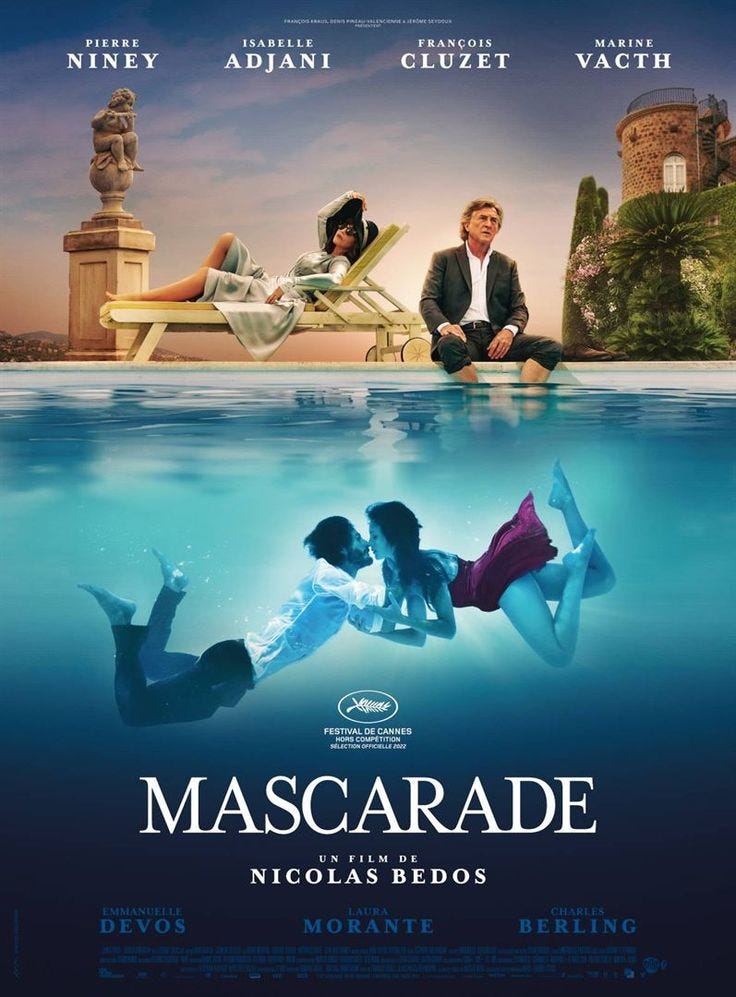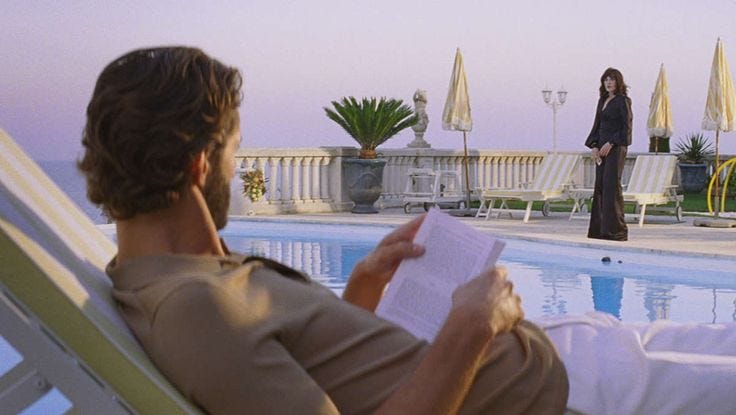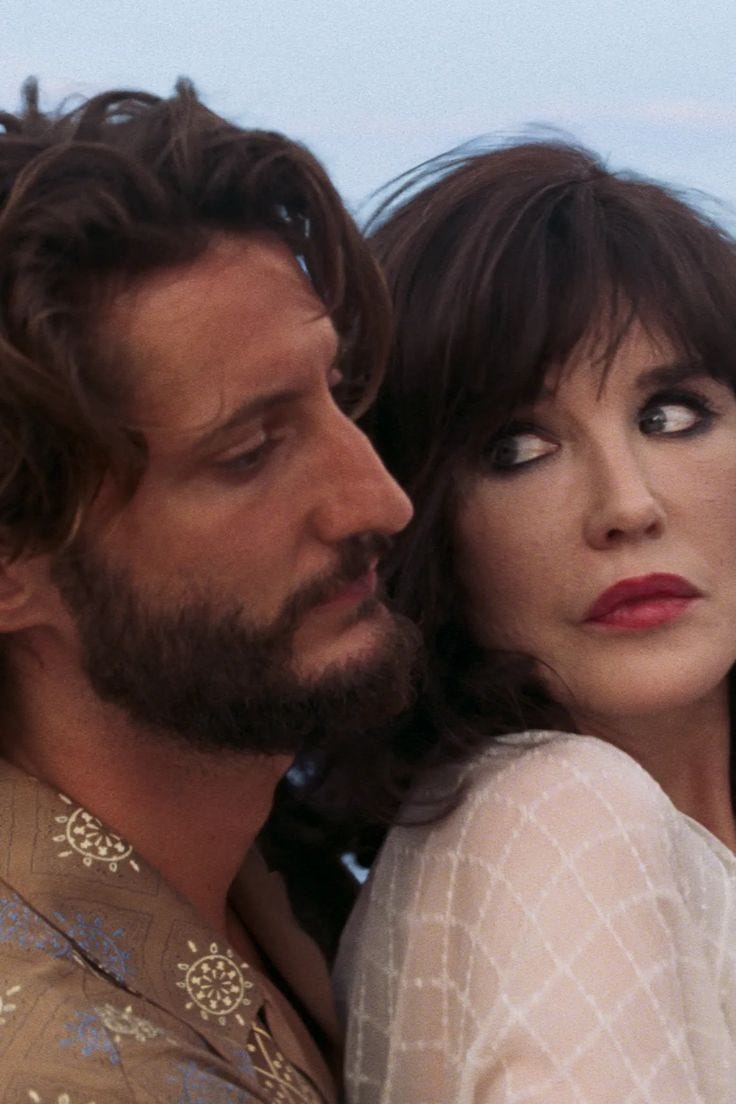Happy Sunday and welcome back to Giselle daydreams! I’ve enjoyed lately watching and rewatching French films. This post and a few coming posts will feature some French movies for the Francophiles among my readers. I particularly enjoy Nicolas Bedos’ films, and a few months ago I wrote about another of his movies Monsieur et Madame Adelman.
I watched Mascarade a while ago with my husband as we appreciate Pierre Niney, and for myself, I’m also a big fan of Marine Vacth and Isabelle Adjani.
Mascarade is a French film directed by Nicolas Bedos, released in 2022. The film explores deceit, love, ambition, and the superficiality of wealth. In Mascarade, Bedos weaves several prominent themes into the narrative, which creates a rich tapestry of social commentary, character exploration, and dramatic tension.
The story centres on a young gigolo named Adrien (played by Pierre Niney), who once had a promising career as a dancer but now spends his days living off his wealthy lover, an ageing ex-movie star named Martha (Isabelle Adjani). Adrien's life of luxury, however, feels hollow, and he begins to grow resentful of the empty excess surrounding him. His dissatisfaction deepens when he meets Margot (Marine Vacth), a cunning woman who also survives by manipulating the rich. Together, Adrien and Margot plot an elaborate scheme to scam the wealthy elite, exploiting the desires, vulnerabilities, and vanities of those around them. What unfolds is a gripping commentary on the moral decay and deception that underpins the glitzy lives of the affluent.
The title itself Mascarade signifies the theme of masquerade — characters are often seen living behind masks, both literally and figuratively. The film explores how people project false identities to gain advantage or hide their true selves. This duality is central to the plot and character dynamics, where personal and public personas frequently clash. The film’s title reflects the lies and deceit at the heart of the characters' lives. The characters engage in manipulation and deceit to achieve their ends, both in their personal and professional lives. Adrien and Margot’s scheme to exploit the rich underscores the duplicity and the often murky line between victim and perpetrator.
Bedos uses wealthy characters to critique a superficial lifestyle filled with materialism and hollow relationships. The characters’ lavish lives mask deeper insecurities, fears, and disillusionments.
At its core, Mascarade also explores the romantic and sexual dynamics between the characters. Despite the lies and manipulation, there is a sense of tragic longing and desire for connection that permeates the relationships. The romantic entanglements and personal connections in the film serve as a means to explore deeper themes of trust, betrayal, and the search for genuine connection. The interactions between characters often involve power plays and control. This is central to the film’s exploration of how individuals use relationships to gain influence and achieve their goals.
The characters engage in complex schemes to manipulate each other, reflecting the theme of deceit as a driving force in their lives. Adrien and Margot’s plan to exploit wealthy individuals underscores how deceit can be both a survival mechanism and a path to power. Bedos explores the blurred lines between right and wrong. Both Adrien and Margot are morally ambiguous characters—driven by ambition and survival instinct, they use others as pawns but also seem trapped in a corrupt system themselves. Adrien and Margot are both victims of their circumstances and perpetrators of deceit. The film does not present clear heroes or villains, instead offering a nuanced view of human behaviour where motivations are often self-serving, yet relatable.
The film portrays its characters with moral complexity, avoiding clear-cut heroes and villains. Adrien and Margot are morally ambiguous figures who both exploit and are exploited. Their actions raise questions about ethics, survival, and personal responsibility. The characters’ motivations are driven by personal gain, often at the expense of others. This examines the extent to which people are willing to compromise their values for success and survival.
The dynamic between Adrien and Margot is central to the film. Adrien’s discontent with his shallow life and Margot’s ambition create a compelling partnership driven by a shared desire for more. Their relationship reflects themes of mutual exploitation and opportunism, as they both use each other to advance their personal agendas. The character of Martha, played by Isabelle Adjani, represents the ageing glamour of the old guard. Her interactions with Adrien reveal the fragility and desperation beneath her facade of elegance. Martha’s character adds depth to the film’s exploration of the passage of time and the fear of irrelevance.
Mascarade offers a critique of social hierarchies and class divisions. The film portrays the rich as morally compromised and often foolish, while the lower-class characters are depicted as resourceful but morally ambiguous. This critique extends to a broader commentary on how social structures perpetuate inequality and ethical dilemmas.
The film delves into questions of identity and self-perception. Characters are often seen grappling with their true selves versus the personas they project. This is particularly evident in how the characters’ public and private lives are starkly different, reflecting their internal conflicts and desires.
The film critiques the superficial nature of wealth and high society. The opulent settings and extravagant lifestyles are portrayed as masks that conceal moral and emotional emptiness. The affluent characters are depicted as living in a facade of opulence and luxury, yet their lives are marked by emptiness and moral decay. The film highlights how wealth often masks deeper personal dissatisfaction and moral compromise. The wealthy characters are often depicted as vain, detached, and ultimately dissatisfied despite their material success. Bedos examines the divide between the wealthy elite and those who manipulate them. The contrast between the affluent characters and those who exploit their weaknesses serves as a critique of social hierarchies and the often hollow nature of wealth.
The film also reflects on the theme of ageing and the fear of becoming obsolete. Characters like Martha, who once thrived in the limelight, grapple with the reality of ageing and diminishing relevance. This is explored through their interactions and the way they cling to past glories. The contrast between past successes and present realities highlights the disillusionment that often accompanies ageing. This adds depth to the characters’ motivations and struggles.
Bedos employs satire to critique societal norms, especially those related to wealth, fame, and social status. The film uses humour and irony to underscore the absurdities and hypocrisies of high society. The characters’ pursuit of success and status often leads to ironic outcomes, revealing the hollowness behind their ambitions. This ironic twist highlights the disconnection between appearance and reality.
Mascarade, like many of Bedos’ films, combines elegance and satire. Bedos uses a striking visual contrast between the glamorous settings and the dark undertones of the narrative. The luxurious environments, beautiful costumes, and high society events serve as a backdrop to contrast the dark themes of deceit, moral emptiness, and more critical elements of the plot. This contrast amplifies the film’s satirical edge. Bedos’ direction blends dark comedy with drama, using humour and tension to underscore the absurdity and hypocrisy of the characters’ actions. Bedos’ sharp wit is evident in the dialogue and scenarios, which often highlight the irony of the characters’ situations.
Mascarade is appreciated for its sharp satire, strong performances, and Bedos’ distinctive directorial style. This film showcases Bedos’ talent for weaving together complex character studies with biting societal commentary. The film offers a darkly humorous critique of contemporary society, wrapped in a stylish and visually arresting package. Critics appreciated its intelligent commentary and the way it combines humour with a critical examination of contemporary society. The film resonates with contemporary audiences due to its exploration of issues like societal excess, personal authenticity, and moral ambiguity. In an era where discussions about wealth and social privilege are increasingly prominent, Mascarade presents a relevant and thought-provoking perspective, with an engaging narrative that examines the nature of deception, the impact of wealth, and the complexities of human relationships. In this film, Bedos pursues yet again his trend of exploring complex relationships, societal decadence, and moral ambiguity, which can be perceived as unsettling to some.
I hope you enjoyed today’s post. Please keep liking, commenting, subscribing and sharing. It helps the newsletter grow. If you would like to support this project and can afford to do so, please consider becoming a paid subscriber.
Giselle xx






My husband and I love a good French film. Adding Mascarade to our list!
finally someone who's seen mascarade 🤍
"The film uses humour and irony to underscore the absurdities and hypocrisies of high society." - no one does this better than the french!